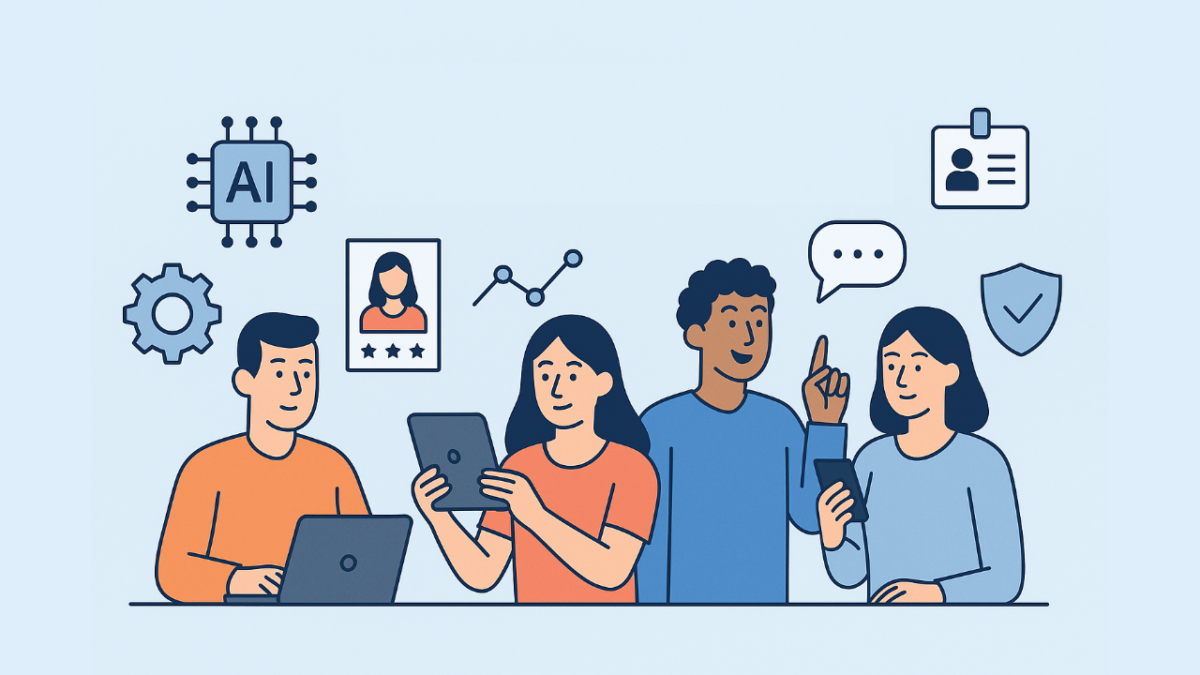The Future of HR Tech: Trends Reshaping the Workplace in 2025 and Beyond
Table of Contents
Introduction
The workplace is transforming faster than ever, and so is the technology behind managing people. From AI-driven recruitment to predictive people analytics, HR tech is evolving from a back-office function to a strategic powerhouse. In 2025 and beyond, HR technology will no longer be optional—it will be the backbone of agile, inclusive, and data-driven workforces.
So, what does the future of HR tech look like? Let’s explore the top trends and innovations that are defining this new era.
AI Is No Longer Just a Tool—It’s a Talent Partner
Artificial Intelligence has shifted from simply screening resumes to playing an active role throughout the employee lifecycle. In 2025, AI systems can:
- Write job descriptions that reduce bias
- Analyze candidate video interviews using sentiment and speech recognition
- Recommend learning modules based on performance data
- Predict attrition risks using behavioral signals
As AI becomes more nuanced, the human-AI collaboration in HR is expected to deepen. However, ethical AI and transparency in algorithmic decision-making will be key concerns for CHROs and HR tech vendors alike.
Hyper-Personalized Employee Experiences
The future of HR tech is employee-centric. Inspired by consumer-grade experiences, HR platforms now offer personalized dashboards, learning journeys, and career pathways. Platforms like SuccessFactors, Workday, and Oracle HCM are integrating AI to surface individualized content—be it benefits, development programs, or internal job moves.
This personalization boosts engagement, retention, and internal mobility—all top priorities in a competitive talent landscape.
Remote Work and Hybrid Work Tech
The global shift to remote and hybrid work models isn’t just a COVID-era trend—it’s now a long-term norm. HR technologies have evolved to:
- Track productivity and engagement remotely
- Facilitate virtual onboarding and training
- Manage distributed teams with location-agnostic payroll and compliance
Tools like Deel, Remote.com, and Papaya Global are growing fast, enabling global hiring and seamless HR operations across time zones.
People Analytics 2.0
Data is the new currency, and HR departments are now using it to make smarter decisions. In 2025, people analytics platforms are no longer limited to tracking headcount and turnover. They offer:
- Predictive insights into employee burnout
- Correlations between training investments and performance
- DEI (Diversity, Equity, Inclusion) scorecards that go beyond vanity metrics
Tools like Visier, Lattice, and Culture Amp are leading the charge in turning raw people data into actionable strategy.
Skills-Based Hiring and Internal Mobility Platforms
With job roles constantly evolving, companies are moving away from rigid job descriptions to skills-based hiring and skills-based development. This future-forward approach enables:
- Hiring for potential rather than pedigree
- Identifying upskilling opportunities within teams
- Matching employees to projects or gigs internally
LinkedIn’s Skills Graph and Eightfold.ai’s Talent Intelligence Platform are already helping companies pivot to this model, enabling agility and resilience in fast-changing industries.
Mental Health & Well-being Tech
Workplace well-being is now a core metric for HR teams, not just a CSR initiative. As burnout and mental health challenges rise, HR tech is responding with:
- 24/7 access to virtual therapy or wellness apps
- Mood-tracking tools integrated into daily check-ins
- Nudges to encourage microbreaks, mindfulness, or PTO
Platforms like Modern Health, Calm for Business, and Headspace have become integral to HR stacks focused on employee wellness.
The Rise of No-Code HR Platforms
Not every HR team has a dedicated developer. No-code platforms are democratizing automation, allowing HR professionals to:
- Create onboarding workflows
- Automate repetitive tasks like document collection
- Set up chatbots for FAQs
No-code HR solutions like Zapier, Tally, and SmartSuite are reducing tech bottlenecks and enabling faster, customized deployments.
Compliance and Ethical Governance Tech
With stricter data privacy regulations (GDPR, CCPA) and AI governance policies on the horizon, HR tech is adapting to ensure compliance. Future-ready HR tools offer:
- Transparent audit trails
- Consent management for employee data
- Role-based access controls
HR teams must now work hand-in-hand with legal and IT to ensure ethical data usage and minimize regulatory risk.
Final Thoughts: HR Tech Is Strategic, Not Supportive
The HR department of the future is not a cost center—it’s a strategic growth driver. With the right technology stack, businesses can attract better talent, build stronger cultures, and make smarter decisions. But to stay ahead, organizations must:
✅ Regularly audit their HR tech stack
✅ Invest in upskilling HR teams to use AI and analytics
✅ Prioritize employee privacy and ethical data usage
The future of HR tech is exciting, dynamic, and employee-first—and those who adapt early will have a competitive edge.
Stay updated on the latest HR tech trends, tools, and innovations at HRTechMunch.com — your go-to destination for the evolving world of HR technology.
iTMunch offers you valuable insights about the HR sector by examining the trends in human resource management, the role technology plays in human resources and how does it benefit HRM. Keep reading iTMunch for news, updates and events in HR!





